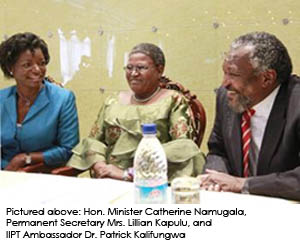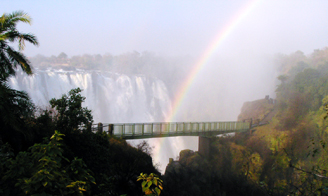
Zambia President Rupiah B. Banda to be Patron of 5th IIPT African Confernce: Meeting the Challenges of Climate Change
Stowe, Vermont, USA – 23 April 2011 – The International Institute for Peace through Tourism (IIPT) announced today that Zambia President, Rupiah B. Banda has agreed to be Patron of the 5 th IIPT African Conference: Meeting the Challenges of Climate Change to Tourism in Africa and the Developing World” to be held in Lusaka, Zambia, May 15 – 20, 2005.
In making the announcement, IIPT Founder and President, Louis D’Amore said, “We are most proud and honored to have President Banda as Patron of the 5th IIPT African Conference. His patronage adds immense stature and prestige to the conference and demonstrates the importance that Zambia has placed on this timely event.”
The aim of the 5th IIPT African Conference is to showcase models of ‘best practice’ in mitigating and addressing the anticipated impacts of climate change to tourism in Africa and the developing world.
The Conference is hosted by the Zambia Ministry of Tourism, Environment and Natural Resources, and organized by the International Institute for Peace through Tourism (IIPT) in partnership with the UN World Tourism Organization (UNWTO), Pacific Asia Travel Association (PATA), World Travel Market, Regional Tourism Organization of Southern Africa (RETOSA), as well as other prestigious partners and supporters.
The conference will bring together leading experts on tourism and climate change, ministers of tourism, senior representatives of UN agencies, senior government officials, senior industry executives from the diverse sectors of the tourism industry, educators, and practitioners from more than 40 countries.
Topics to be covered include: Climate Change: Policy and Planning to Practice;
The Central Role of Parks and Wilderness Areas; Perspectives on Sustainable Destinations; The Human and Cultural Dimensions of Climate Change;
Establishing Guidelines and Business Strategies for Sustainable Tourism;
Coastal Tourism Strategies and Water Management – and other critical topic areas.
The conference will also include the first ever “Traditional Leaders Forum on Tourism” to be held in Africa with Ben Sherman, President, Native Tourism Alliance, North America, as a special guest.
About International Institute for Peace through Tourism IIPT is dedicated to fostering and facilitating tourism initiatives which contribute to international understanding and cooperation, an improved quality of environment, the preservation of heritage, poverty reduction, and the resolution of conflict - and through these initiatives, help bring about a more peaceful and sustainable world. IIPT is dedicated to mobilizing travel and tourism, the world’s largest industry, as the world’s first “Global Peace Industry,” an industry that promotes and supports the belief that “Every traveler is potentially an Ambassador for Peace.”
International Institute for Peace through Tourism
685 Cottage Club Road, Unit 13, Stowe, VT 05672
Phone: +1 802 253 8671
Fax: +1 802 253 2645



















